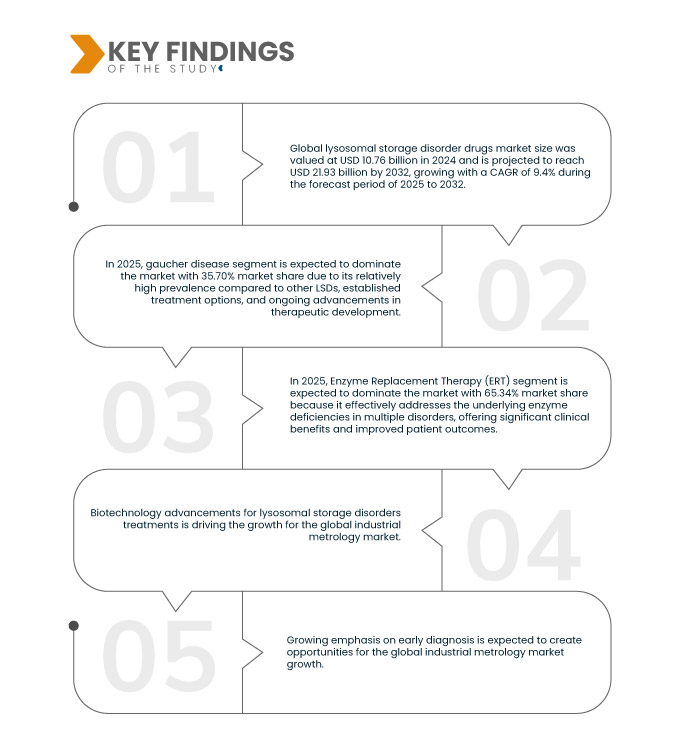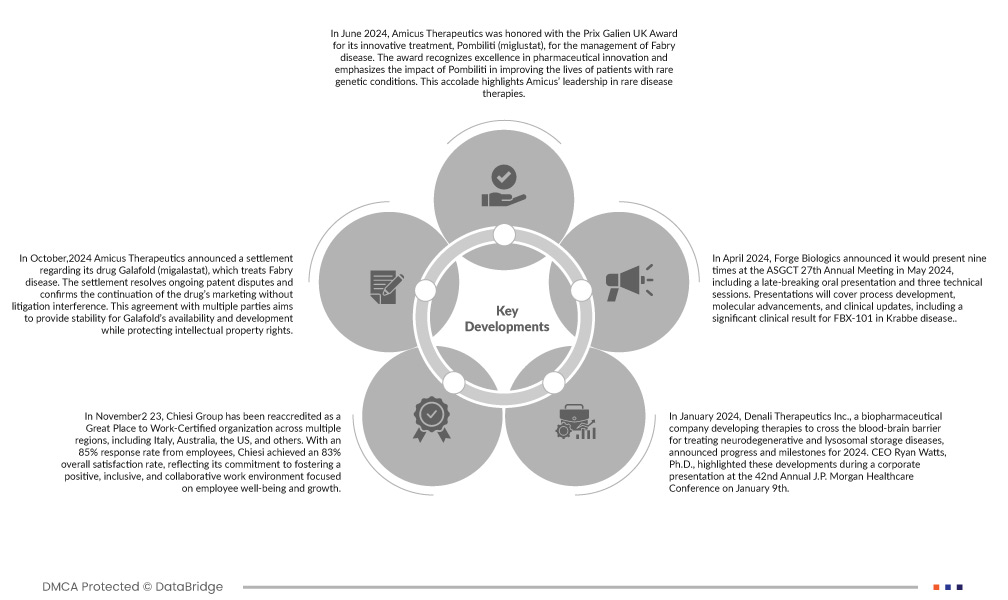バイオテクノロジーの進歩は、リソソーム蓄積疾患(LSD)の治療環境を変革する上で極めて重要な役割を果たし、患者により効果的でカスタマイズされた治療オプションを提供しています。酵素補充療法(ERT)は、これらの疾患を引き起こす酵素欠乏に直接対処することで、リソソーム蓄積疾患(LSD)の治療に革命をもたらしました。LSD患者では、特定の酵素の欠乏により細胞内に毒性物質が蓄積し、臓器や組織が損傷します。ERTは、不足している酵素を補うために合成酵素を投与することで、代謝機能を改善し、症状を緩和します。長年にわたり、ERTは酵素の吸収を改善し、副作用を減らす、より効果的な新しい製剤と送達方法によって大きく進歩しました。これらの革新は、病気の進行の遅延、臓器障害の軽減、患者の生活の質の向上など、より良い臨床結果をもたらしました。
酵素補充療法(ERT)は、リソソーム蓄積症(LSD)の原因となる欠損酵素を補充することで、LSDの治療に革命をもたらしました。これらの酵素がないと、細胞内に毒性物質が蓄積し、臓器や組織に損傷を与えます。ERTは合成酵素を供給して正常な機能を回復させ、代謝を改善し、症状を緩和します。ERTは、時間の経過とともに、処方と投与方法の改良により効果を高め、疾患の進行を遅らせ、臓器損傷を軽減するなど、より良い臨床結果をもたらしています。個別化ERT治療は、個々の患者にとってさらに優れた結果をもたらしました。より多くのリソソーム蓄積症患者がこれらの治療法の恩恵を受けるにつれて、ERTの需要は高まり続け、市場の成長を後押ししています。これらのバイオテクノロジーの進歩は、効果的な治療を提供し、患者と医療提供者の信頼を高め、世界のリソソーム蓄積症治療薬市場にとって重要な原動力となっています。
完全なレポートはこちら: https://www.databridgemarketresearch.com/reports/global-lysosomal-storage-disorder-drugs-market
データブリッジ市場調査は、世界のリソソーム蓄積疾患治療薬市場規模は2024年に107億6,000万米ドルと評価され、2025年から2032年の予測期間中に9.4%のCAGRで成長し、2032年までに219億3,000万米ドルに達すると予測していると分析しています。
研究の主な結果
リソソーム蓄積疾患に対する新たな個別化医療
台頭する個別化医療は、患者個々の遺伝子プロファイルに合わせた治療法を提供することで、リソソーム蓄積疾患(LSD)の治療環境を変革しつつあります。LSDは酵素機能に影響を与える遺伝子変異によって引き起こされますが、これらの変異は患者間で大きく異なります。個別化治療では、患者固有の遺伝子構成を分析し、より的を絞ったアプローチを開発することで、酵素補充療法や遺伝子治療などの治療法の有効性を最大限に高めます。この精密な解析により、患者個々のニーズに合わせた治療をより適切に実施し、副作用を最小限に抑え、治療成果を向上させることができます。遺伝子検査と技術の進歩に伴い、医療提供者は最適な介入方法を特定できるようになり、治療反応率と全体的な治療成功率の向上が期待されます。個別化医療への移行は、カスタマイズされたLSD治療法の開発を加速させており、疾患管理に革命をもたらすことが期待されています。これらの革新により、世界のリソソーム蓄積疾患治療薬市場では、より効果的で個別化された治療選択肢への需要が高まっています。したがって、パーソナライズ医療は治療効果を高め、患者の転帰を改善し、治療選択肢への信頼を高めるため、市場成長の重要な原動力となります。
レポートの範囲と市場セグメンテーション
レポートメトリック
|
詳細
|
予測期間
|
2025年から2032年
|
基準年
|
2024
|
歴史的な年
|
2023年(2013~2017年にカスタマイズ可能)
|
定量単位
|
収益(10億米ドル)
|
対象セグメント
|
疾患の種類 (ゴーシェ病、ファブリー病、ポンペ病、ムコ多糖症 (MPS)、ニーマン・ピック病、クラッベ病など)、タイプ (酵素補充療法 (ERT)、基質還元療法 (SRT)、シャペロン療法など)、薬剤 (イミグルセラーゼ、アガルシダーゼ ベータ、イデュルスルファーゼ、アルグルコシダーゼ アルファ、ベラグルセラーゼ、タリグルセラーゼ アルファ、ラロニダーゼ、アガルシダーゼ アルファ、ガルスルファーゼ、アバルグルコシダーゼ アルファなど)、投与経路 (静脈内 (IV)、皮下 (SC)、経口など)、年齢層 (小児、成人、高齢者)、性別 (男性、女性)、流通チャネル (病院薬局、ドラッグストア、薬局、オンライン薬局)
|
対象国
|
米国、カナダ、メキシコ、ドイツ、英国、イタリア、フランス、スペイン、ロシア、スイス、トルコ、ベルギー、オランダ、デンマーク、スウェーデン、ポーランド、ノルウェー、フィンランド、その他のヨーロッパ諸国、日本、中国、韓国、インド、シンガポール、タイ、インドネシア、マレーシア、フィリピン、オーストラリア、ニュージーランド、ベトナム、台湾、その他のアジア太平洋諸国、ブラジル、アルゼンチン、その他の南米諸国、南アフリカ、エジプト、バーレーン、アラブ首長国連邦、クウェート、オマーン、カタール、サウジアラビア、その他の中東およびアフリカ諸国
|
対象となる市場プレーヤー
|
サノフィ(フランス)、バイオマリン(米国)、ファイザー(米国)、アミカス・セラピューティクス(米国)、武田薬品工業(日本)、ウルトラジェニクス・ファーマシューティカル(米国)、オーチャード・セラピューティクス(英国)、スパー・セラピューティクス(英国)、サンガモ・セラピューティクス(米国)、プロタリックス・バイオセラピューティクス(イスラエル)、キエス・ファルマセウチ(イタリア)、フォージ・バイオロジクス(米国)、デナリ・セラピューティクス(米国)、リージェンクスバイオ(米国)、JCRファーマシューティカルズ(日本)など
|
レポートで取り上げられているデータポイント
|
データブリッジマーケットリサーチがまとめた市場レポートには、市場価値、成長率、セグメンテーション、地理的範囲、主要プレーヤーなどの市場シナリオに関する洞察に加えて、輸出入分析、生産能力の概要、生産消費分析、価格動向分析、気候変動シナリオ、サプライチェーン分析、バリューチェーン分析、原材料/消耗品の概要、ベンダー選択基準、PESTLE分析、ポーター分析、規制枠組みも含まれています。
|
セグメント分析
世界のリソソーム蓄積疾患薬市場は、疾患の種類、タイプ、薬剤、投与経路、年齢層、性別、流通チャネルに基づいて、7 つの主要なセグメントに分類されています。
- 疾患の種類に基づいて、世界のリソソーム蓄積症薬市場は、ゴーシェ病、ファブリー病、ポンペ病、ムコ多糖症(MPS)、ニーマンピック病、クラッベ病などに分類されます。
2025年には、ゴーシェ病セグメントが世界のリソソーム蓄積疾患薬市場を支配すると予想されています。
2025年には、ゴーシェ病セグメントが、他のLSDと比較して有病率が比較的高いこと、治療オプションが確立されていること、および治療法開発が継続的に進歩していることから、35.70%の市場シェアで市場を支配すると予想されています。
- タイプに基づいて、世界のリソソーム蓄積障害薬市場は、酵素補充療法(ERT)、基質還元療法(SRT)、シャペロン療法、その他に分類されます。
2025年には、酵素補充療法(ERT)セグメントが世界のリソソーム蓄積障害薬市場を支配すると予想されています。
2025年には、酵素補充療法(ERT)セグメントが、複数の疾患の根本的な酵素欠乏に効果的に対処し、大きな臨床的利益と患者の転帰の改善をもたらすため、65.34%の市場シェアで市場を支配すると予想されています。
- 薬剤別に見ると、世界のリソソーム蓄積症治療薬市場は、イミグルセラーゼ、アガルシダーゼベータ、イデュルスルファーゼ、アルグルコシダーゼアルファ、ベラグルセラーゼ、タリグルセラーゼアルファ、ラロニダーゼ、アガルシダーゼアルファ、ガルスルファーゼ、アバルグルコシダーゼアルファ、その他に分類されます。 2025年には、イミグルセラーゼが23.55%の市場シェアで市場を席巻すると予想されています。
- 投与経路に基づいて、世界のリソソーム蓄積症治療薬市場は、静脈内(IV)、皮下(SC)、経口、その他に分類されます。2025年には、静脈内(IV)セグメントが57.97%の市場シェアで市場を独占すると予想されています。
- 年齢層に基づいて、世界のリソソーム蓄積症治療薬市場は、小児、成人、高齢者に分類されます。2025年には、小児セグメントが42.99%の市場シェアで市場を独占すると予想されています。
- 性別に基づいて、世界のリソソーム蓄積症治療薬市場は男性と女性に区分されています。2025年には、男性セグメントが56.48%の市場シェアで市場を独占すると予想されています。
- 流通チャネルに基づいて、世界のリソソーム蓄積症治療薬市場は、病院薬局、ドラッグストアおよび小売薬局、オンライン薬局に分類されます。2025年には、病院薬局セグメントが69.05%の市場シェアで市場を独占すると予想されています。
主要プレーヤー
Data Bridge Market Research は、サノフィ (フランス)、バイオマリン (米国)、ファイザー社 (米国)、アミカス・セラピューティクス社 (米国)、武田薬品工業株式会社 (日本) などの企業を市場のプレーヤーとして認識しています。
市場動向
- ファイザーは2024年8月、米国の消費者の医療アクセスを簡素化することを目的としたデジタルプラットフォーム「PfizerForAll」を立ち上げました。このプラットフォームは、一般的な病気、処方箋、予防接種の管理に必要なリソースを統合し、医療機関と提携することで、効率的なサービスとファイザー医薬品の潜在的な節約を実現します。
- 2024年10月、アミカス・セラピューティクス社は、ファブリー病治療薬であるGalafold(ミガラスタット)に関する和解を発表しました。この和解により、進行中の特許紛争が解決され、訴訟による妨害を受けることなく同薬の販売を継続できることが確認されました。複数の当事者とのこの合意は、知的財産権を保護しながら、Galafoldの安定的な供給と開発を確保することを目的としています。
- 2024年6月、アミカス・セラピューティクスは、ファブリー病の革新的な治療薬「ポンビリティ(ミグルスタット)」により、英国でPrix Galien賞を受賞しました。この賞は、医薬品のイノベーションにおける卓越性を称えるものであり、希少遺伝性疾患の患者さんの生活改善におけるポンビリティの貢献を高く評価するものです。この栄誉は、アミカスの希少疾患治療におけるリーダーシップを際立たせています。
- 2023年11月、キエージグループはイタリア、オーストラリア、米国など複数の地域で「働きがいのある会社」として再認定されました。従業員からの回答率は85%で、キエージは総合満足度83%を達成しました。これは、従業員の健康と成長を重視し、前向きで包括的、かつ協調的な職場環境の醸成に注力している姿勢を反映しています。
- 2024年1月、神経変性疾患およびリソソーム蓄積疾患の治療のために血液脳関門を通過する治療法を開発しているバイオ医薬品会社、デナリ・セラピューティクス社は、2024年の進捗状況とマイルストーンを発表しました。CEOのライアン・ワッツ博士は、1月9日に開催された第42回JPモルガン・ヘルスケア・カンファレンスでの企業プレゼンテーションでこれらの開発を強調しました。
地域分析
地理的に、市場レポートでカバーされている国は、米国、カナダ、メキシコ、ドイツ、英国、イタリア、フランス、スペイン、ロシア、スイス、トルコ、ベルギー、オランダ、デンマーク、スウェーデン、ポーランド、ノルウェー、フィンランド、その他のヨーロッパ諸国、日本、中国、韓国、インド、シンガポール、タイ、インドネシア、マレーシア、フィリピン、オーストラリア、ニュージーランド、ベトナム、台湾、その他のアジア太平洋諸国、ブラジル、アルゼンチン、その他の南米諸国、南アフリカ、エジプト、バーレーン、アラブ首長国連邦、クウェート、オマーン、カタール、サウジアラビア、その他の中東およびアフリカ諸国です。
Data Bridge Market Researchの分析によると:
北米が世界のリソソーム蓄積障害治療薬市場を支配すると予想されている
北米は、先進的な医療インフラ、薬剤の採用率の高さ、多額の研究開発投資、そして患者数が多いことから、世界のリソソーム蓄積疾患薬市場を支配すると予想されています。
アジア太平洋地域は、世界のリソソーム蓄積疾患治療薬市場において最も急速に成長する地域になると予想されています。
アジア太平洋地域は、医療インフラの拡充、リソソーム蓄積疾患の罹患率の上昇、先進的治療法に対する認識の高まりにより、最も急速に成長すると予想されています。
世界のリソソーム蓄積障害薬市場レポートの詳細については、こちらをクリックしてください – https://www.databridgemarketresearch.com/reports/global-lysosomal-storage-disorder-drugs-market













